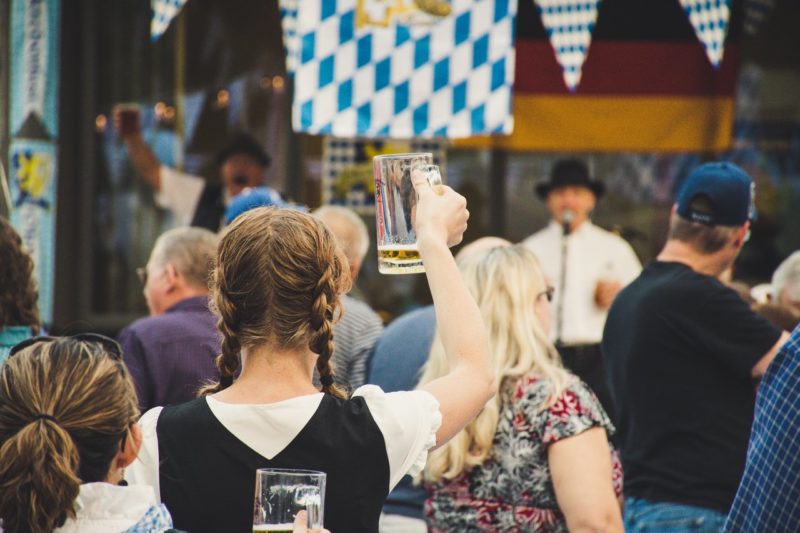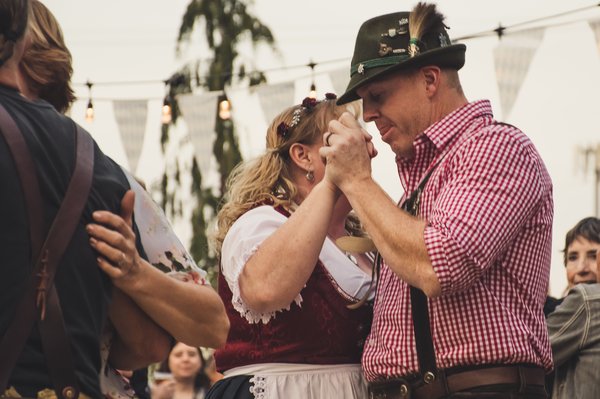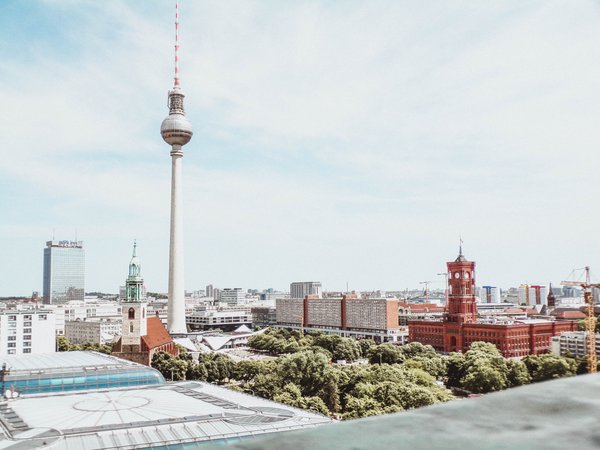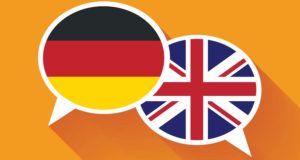Learn Common German Phrases
Whether you’re planning to travel to Germany, or you’re actively learning the language, you need to know the most common German phrases. Having these phrases handy will make your vacation smoother and much more comfortable.
And if you’re learning German to reach fluency, knowing common phrases is a must. Since 80% of everyday speech is from 20% of the vocabulary, these German expressions is how the locals talk. So, the fastest way to fluency is by mastering the following German phrases.
160 Everyday German Phrases
These 160 phrases are exactly what you need for travel, or to get around in Germany. We divided them into different categories to help you find the phrase that suits your situation best. In the end, you’ll find a list of emergency German phrases that are a must-have in case of illness or an accident. Though we sure hope you never have to use them, it’s best to have them just in case.

The Most Common German Greetings
Hi! |
Hallo! |
Good morning! |
Guten Morgen! |
Good evening! |
Guten Abend! |
Welcome! (to greet someone) |
Willkommen! |
How are you? |
Wie geht’s dir/ Ihnen? |
I’m fine, thanks! |
Danke, mir geht’s gut! |
And you? |
Und dir/Ihnen? |
Good/ So-So. |
Gut/ So la-la |
Thank you (very much)! |
Danke (vielmals)!/ Vielen Dank! |
You’re welcome! (for “thank you”) |
Gern gescheh’n!/ Keine Ursache!/ Kein Problem! |
What’s new? |
Was gibt’s Neues? |
Nothing much. |
Nicht viel. |
Good night! |
Gute Nacht! |
See you later! |
Bis später! |
Good bye! |
Auf Wiedersehen!/ Tschüß! |
Asking for Help and Directions in Germany
I’m lost. |
Ich habe mich verlaufen! |
Can I help you? |
Kann ich dir/ Ihnen helfen? |
Can you help me? |
Kannst du/ Können Sie mir helfen? |
Where is the (bathroom/ pharmacy)? |
Wo ist (das Badezimmer/ die Apotheke?) |
Go straight! then turn left/ right! |
Gehen Sie geradeaus! Dann links / rechts abbiegen! |
One moment please! |
Einen Augenblick, bitte! |
Hold on please! (phone) |
Bleiben Sie dran, bitte! |
How much is this? |
Was kostet das?/ Wie teuer ist das? |
Excuse me …! (to ask for something) |
Entschuldigen Sie bitte…! |
Excuse me! ( to passer by) |
Darf ich mal vorbei? |
Phrases to Introduce Yourself in German
Do you speak (English/ German)? |
Sprechen Sie (Englisch/ Deutsch)? |
Just a little. |
Nur ein bißchen. |
What’s your name? |
Wie heißen Sie? |
My name is … |
Ich heiße… / Mein Name ist… |
Mr…/ Mrs.…/ Miss… |
Herr/ Frau/ Fräulein (not used anymore) |
Nice to meet you! |
Schön, Sie kennenzulernen! |
You’re very kind! |
Du bist/ Sie sind sehr freundlich! |
Where are you from? |
Woher kommst du/ kommen Sie? |
I’m from (the U.S/ Germany) |
Ich komme (aus den U.S.A./ aus Amerika / aus Deutschland) |
I’m (American) |
Ich bin (Amerikaner) |
Where do you live? |
Wo wohnst du/ wohnen Sie? |
I live in (the U.S/ Germany). |
Ich wohne (in den U.S.A./ in Amerika/ in Deutschland) |
Did you like it here? |
Gefällt es dir/ Ihnen hier? |
Germany is a wonderful country. |
Deutschland ist wunderschön |
What do you do for a living? |
Was ist dein/ Ihr Beruf? |
I work as a (translator/ businessman). |
Ich bin (Übersetzer/Dolmetscher) / Geschäftsmann |
I like German. |
Ich mag Deutsch |
I’ve been learning German for 1 month. |
Ich lerne seit einem Monat Deutsch |
Oh! That’s good! |
Oh! Das ist toll! |
How old are you? |
Wie alt bist du/ sind Sie? |
I’m (twenty, thirty…) years old. |
Ich bin (zwanzig, dreißig,…) Jahre (alt). |
I have to go. |
Ich muß gehen/ los! |
I will be right back! |
Ich bin sofort wieder da! |
Wishing Someone Well in German
Good luck! |
Viel Glück! |
Happy birthday! |
Alles Gute zum Geburtstag! |
Happy New Year! |
Ein frohes neues Jahr! |
Merry Christmas! |
Fröhliche Weihnachten! |
Congratulations! |
(Herzlichen) Glückwunsch! |
Enjoy! (for meals…) |
Guten Appetit! |
Bless you! (when sneezing) |
Gesundheit! |
Good night and sweet dreams! |
Gute Nacht und träum was schönes! |
German Phrases for Clarifications and Questions
Sorry! (for a mistake) |
Entschuldigung!/ Es tut mir leid! |
No Problem! |
Kein Problem!/ Keine Ursache! |
Can You Say It Again? |
Kannst du/ Können Sie das nochmal wiederholen? |
Can You Speak Slowly? |
Kannst du/ Können Sie (etwas) langsamer sprechen? |
Write It Down Please! |
Schreib/ Schreiben Sie es bitte auf! |
I Don’t Understand! |
Ich verstehe das/ dich/ Sie nicht! (das:that, dich:you, Sie:you polite) |
I Don’t Know! |
Ich weiß (es) nicht! |
I Have No Idea. |
Ich habe keine Ahnung. |
What’s That Called In German? |
Wie heißt das auf deutsch? |
What Is This? |
Was ist das (hier)? |
My German is bad. |
Mein Deutsch ist schlecht. |
I need to practice my German. |
Ich muß (mein) Deutsch üben. |
Don’t worry! |
(Nur) Keine Sorge! |
German Expressions, Single Word Sentences, and Slang
Good/ Bad/ So-So. |
gut/ schlecht/ so la-la |
Big/ Small |
groß/ klein. |
Today/ Now |
heute/ jetzt |
Tomorrow/ Yesterday |
morgen/ gestern |
Yes/ No |
ja/ nein |
Here you go! (when giving something) |
Bitte sehr!/ Bitte schön! |
Do you like it? |
Gefällt’s dir/ Ihnen? |
I really like it! |
Mir gefällt es sehr gut! |
I’m hungry/ thirsty. |
Ich habe Hunger/Durst. |
What time is it? |
Wieviel Uhr ist es?/ Wie spät ist es? |
I need a doctor. |
Ich brauche einen Arzt. |
My (telephone) number is … |
Meine Telefonnummer ist … |
You can call me at any time. |
Du kannst mich jederzeit anrufen |
You can send me a text message. |
Du kannst mir eine SMS/Textnachricht schicken |
Enjoy the meal! |
Guten Appetit! |
I‘m bored! |
Mir ist langweilig |
Be quiet! |
Sei ruhig! |
Leave me alone! |
Lass mich in Ruhe! |
I miss you. |
Ich vermisse dich |
I love you. |
Ich liebe dich |
I like you. |
Ich mag dich/Ich habe dich gern |
Are you free tomorrow evening? |
Hast Du morgen Abend Zeit? |
I would like to invite you to dinner. |
Ich möchte Dich zum Abendessen einladen. |
I‘m not interested! |
Interessiert mich nicht! |
Can I have your phone number? |
Kann ich deine Telefonnummer haben? |
I‘m just kidding! |
Ich mache nur Spaß |
I‘m serious! |
Ich meine es Ernst. |
Oh gosh! |
Ach je! |
It sucks! |
Mist! |
Essential German Travel Phrases
Wie viel kostest ein Ticket? |
How much does a ticket cost? |
Ich möchte ein Ticket/zwei Tickets kaufen |
I would like to buy a ticket/two tickets |
Gibt es eine Ermäβigung für Kinder/Studenten/Rentner? |
Is there a concession for children/students/retired people? |
Wo ist der Eingang? |
Where is the entrance? |
Wo sind die Toiletten? |
Where are the toilets? |
Gibt es hier einen Souvenir-Laden? |
Is there a souvenir shop? |
Wann öffnet der Freizeitpark? |
When does the amusement park open? |
Wann schlieβt das Museum? |
When does the museum close? |
Wie heiβt dieses Gebäude? |
What is the name of this building? |
Was sind die Öffnungseiten der Kunstgalerie/des Musems/ der Kirche? |
What are the opening hours of the art gallery/the museum/the church? |
Gibt es Informationen auf Englisch? |
Is there information in English available? |
Darf man hier fotografieren? |
Are you allowed to take pictures here? |
Die Kirche ist geschlossen |
The church is closed |
Das Kunstmuseum ist geöffnet |
The art gallery is open |
Der Eintritt ist kostenlos |
The entrance is free of charge |
Es gibt eine Führung durch das Schloss |
There is a tour through the castle |
Der Eingang |
The entrance |
Der Ausgang |
The exit |
Betreten verboten |
Access forbidden |
Man kann hier nur ohne Blitzlicht fotografieren |
You can take pictures but only without flash |
German Phrases for Dining Out
Ich habe Hunger/Durst |
I am hungry/thirsty |
Ich brauche etwas zu essen/zu trinken |
I need something to eat/drink |
Wo gibt es ein gutes Restaurant? |
Where can I find a good restaurant? |
Welches Restaurant empfiehlst du/empfehlen Sie? |
Which restaurant do you recommend? |
Ich möchte gerne etwas bestellen |
I would like to order something |
Die Karte, bitte |
The menu, please |
Haben Sie eine Karte auf Englisch? |
Do you have a menu in English? |
Was ist das? |
What is that? |
Ich hätte gerne ein Bier/eine Cola/einen Kaffee/ein Mineralwasser/einen Saft/einen Wein |
I would like a beer/coke/coffee/mineral water/juice/wine |
Ich nehme den Fisch/das Rindfleisch/das Schweinfleisch/den Gemüseauflauf |
I take the fish/beef/pork/vegetable bake |
Das habe ich nicht bestellt |
That’s not what I ordered |
Das Essen ist kalt |
The food is cold |
Haben Sie Salz/Pfeffer? |
Do you have salt/pepper? |
Was gibt es zum Nachtisch? |
What do you have for dessert? |
Das Essen war sehr lecker. |
The food was very tasty. |
Die Rechnung, bitte |
The bill, please |
Kann ich mit Kreditkarte zahlen? |
Can I pay with a credit card? |
German Phrases in Case of an Emergency
Hilfe! |
Help! |
Man hat meine Tasche geklaut |
Someone stole my bag |
Rufen Sie die Polizei an! |
Call the police! |
Wo ist die Polizeiwache? |
Where is the police station? |
Jemand hat mein Geld gestohlen |
Someone stole my money |
Lassen Sie mich alleine! |
Leave me alone! |
Ich habe meinen Reisepass verloren |
I lost my passport |
Wo ist die amerikanische Botschaft? |
Where is the American embassy? |
Ich habe Schmerzen |
I am in pain |
Wo ist das Krankenhaus? |
Where is the hospital? |
Ich brauche einen Doktor |
I need a doctor |
Ich habe Kopfschmerzen/Halsschmerzen/Bauchschmerzen |
I’ve got a headache/sore throat/upset stomach |
Ich habe mein Bein/meinen Arm/meinen Finger gebrochen |
I broke my leg/arm/finger |
Mir ist schlecht |
I feel sick |
Ich habe Durchfall |
I have diarrhea |
Ich habe eine Erkältung/eine Grippe |
I have a cold/the flu |
Ich muss mich hinlegen |
I need to lie down |
Mir ist schwindelig |
I feel dizzy |
Ich muss mich übergeben |
I need to throw up |
Why Learn Common German Phrases
When you’re preparong for your travels, the last thing you want to do is study. And 160 phrases seems like a LOT. But, these phrases can (sometimes literally) save your life. These are just a few of the reasons why you should get familiar with most of these German phrases:
- Navigate in Germany: If you’re lost, you can always ask for directions with these German phrases.
- Have an authentic German experience: Germans are always delighted to hear that you’re learning their language. If you ask in German, they can show you hidden gems in their locals area that normal tourists don’t even know about. So, you can have way more opportunities if you speak a little bit of German.
- Get better customer service: A server or bartender will definitely appreciate it if you try to order in German. That extra bit of effort is not just polite, it’s also very flattering. You’ll receive better customer service than other visitors.
- Be prepared for an emergency: Although no one likes to think of it, but accidents do happen sadly. And when they do, it’s best to be prepared. Have a few German emergency phrases handy in case you need to use them on your trip.
- Google Translate isn’t reliable: As amazing as Google Translate is, it’s not the real deal. Besides, what do you do if you don’t have Wifi or data? You’d be lost without it. Learning a few of these German phrases by heart can make your journey much more comfortable.
- Fall in love with the language: Hopefully, this is only the beginning of your German language learning journey. These phrases are the most common in German, but there’s a lot more to this exciting language. By learning these phrases, you get a great head start, and you can also fall in love with German for further learning.
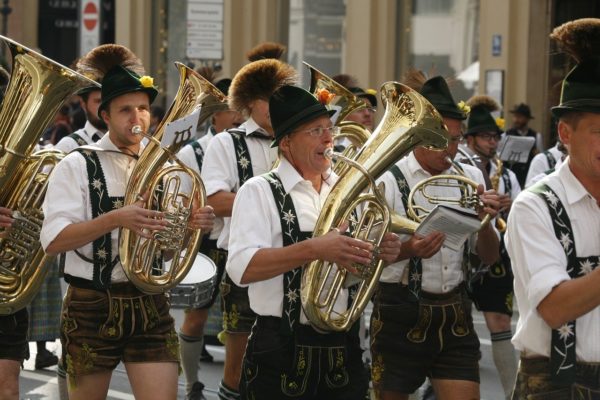
How Do You Learn These German Phrases
Hopefully, by now you’re convinced of how important it is to know these German phrases by heart. Now the real “work” begins. But, don’t worry, it’s actually very easy to learn these common German phrases. Here’s a step by step guide on how to commit them to your long term memory:
- Don’t cram: First and foremost, let’s discuss what not to do. Don’t try to cram, you’ll only make yourself miserable. And in the end, you won’t actually be able to say any of these German phrases out loud. Instead of sitting down and studying, try the following method to learn effectively:
- Try chunking: 160 phrases in German is a little too much. Break them up into smaller categories, and learn them one by one. Or have a goal of 5-10 new phrases a day. Having a smaller workload is easier to manage.
- Use spaced repetition: This is the trick for language learning. Spaced repetition means that you train your brain to store relevant information. You need to review the phrases periodically to remind your brain. This is how you don’t forget these German phrases.
- Write them down: After reading through these phrases, it’s worth writing them down as well. Handwriting is linked to tactile learning, so you’ll remember this lesson better.
- Say them out loud: The only way to fluency is through speaking practice. These phrases are awesome, but when you use them, you’ll have to say them out loud. Let yourself get comfortable with German by saying these phrases.
- Practice them often: And finally, plenty of practice is how you reach fluency. Don’t just go through these phrases once. Come back again to practice them. A little bit every day can go a long way.
Learn More German Phrases
Hungry for more? 160 German phrases are a great start, but you need a lot more to be completely fluent and proficient in German. If you want to unlock the full list of the most useful and common German phrases, all you have to do is download OptiLingo.
This app includes every German word and phrase to get you to fluency. This vocabulary is especially useful because it’s the same on German locals use. Don’t waste time learning unnecessary German words. Go straight to success when you download OptiLingo!

